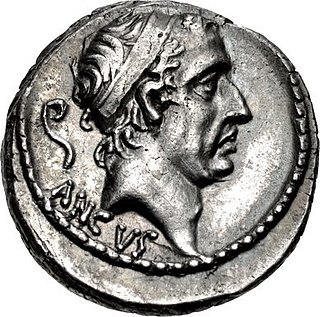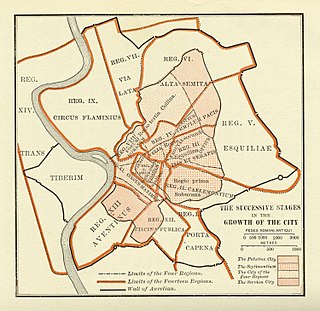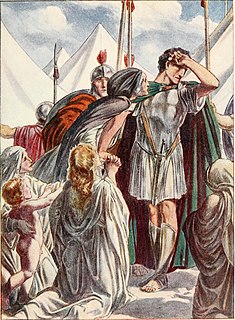
Ancus Marcius was the legendary fourth king of Rome, who traditionally reigned from 642 to 617 BC. Upon the death of the previous king, Tullus Hostilius, the Roman Senate appointed an interrex, who in turn called a session of the assembly of the people who elected the new king. Ancus is said to have ruled by waging war as Romulus did, while also promoting peace and religion as Numa did.

Lucius Tarquinius Priscus, or Tarquin the Elder, was the legendary fifth king of Rome and first of its Etruscan dynasty. He reigned from 616 to 579 BC. Tarquinius expanded Roman power through military conquest and grand architectural constructions. His wife was the prophet Tanaquil.

Plutarch was a Greek Middle Platonist philosopher, historian, biographer, essayist, and priest at the Temple of Apollo in Delphi. He is known primarily for his Parallel Lives, a series of biographies of illustrious Greeks and Romans, and Moralia, a collection of essays and speeches. Upon becoming a Roman citizen, he was named Lucius Mestrius Plutarchus.

The Roman Kingdom, also referred to as the Roman monarchy, or the regal period of ancient Rome, was the earliest period of Roman history, when the city and its territory were ruled by kings.

The pontifex maximus was the chief high priest of the College of Pontiffs in ancient Rome. This was the most important position in the ancient Roman religion, open only to patricians until 254 BC, when a plebeian first occupied this post. Although in fact the most powerful office in the Roman priesthood, the pontifex maximus was officially ranked fifth in the ranking of the highest Roman priests, behind the rex sacrorum and the flamines maiores.
In Roman mythology, Dea Tacita was a goddess of the dead. Ovid's Fasti includes a passage describing a rite propitiating Dea Tacita in order to "seal up hostile mouths / and unfriendly tongue" at Feralia on 21 February. In later times, she was equated with the naiad Larunda. In this guise, Dea Tacita was worshipped at a festival called Larentalia on 23 December. Goddesses Mutae Tacitae were invoked to destroy a hated person: in an inscription from Cambodunum in Raetia, someone asks "ut mutus sit Quartus" and "erret fugiens ut mus". These silent goddesses are the personification of terror of obscurity. Plutarch, who describes Tacita as a Muse, states that Numa Pompilius credited Tacita for his oracular insight and taught the Romans to worship her.

Numa Pompilius was the legendary second king of Rome, succeeding Romulus after a one-year interregnum. He was of Sabine origin, and many of Rome's most important religious and political institutions are attributed to him, such as the Roman calendar, Vestal Virgins, the cult of Mars, the cult of Jupiter, the cult of Romulus, and the office of pontifex maximus.

The Sabines were an Italic people that lived in the central Apennine Mountains of the ancient Italian Peninsula, also inhabiting Latium north of the Anio before the founding of Rome.

Tullus Hostilius was the legendary third king of Rome. He succeeded Numa Pompilius and was succeeded by Ancus Marcius. Unlike his predecessor, Tullus was known as a warlike king who according to the Roman Historian Livy, believed the more peaceful nature of his predecessor had weakened Rome. It has been attested that he sought out war and was even more warlike than the first king of Rome, Romulus. Accounts of the death of Tullus Hostillus vary. In the mythological version of events Livy describes, he had angered Jupiter who then killed him with a bolt of lightning. Non mythological sources on the other hand describe that he died of plague.

Egeria was a nymph attributed a legendary role in the early history of Rome as a divine consort and counselor of Numa Pompilius, the second king of Rome, to whom she imparted laws and rituals pertaining to ancient Roman religion. Her name is used as an eponym for a female advisor or counselor.
Gaius Papirius was pontifex maximus in 509 BC, the first year of the Roman Republic. He copied the religious ordinances established by Numa Pompilius, the second King of Rome, which his grandson, Ancus Marcius, had carved on oaken tablets, and placed in the Forum.

The gens Marcia, occasionally written Martia, was one of the oldest and noblest houses at ancient Rome. They claimed descent from the second and fourth Roman Kings, and the first of the Marcii appearing in the history of the Republic would seem to have been patrician; but all of the families of the Marcii known in the later Republic were plebeian. The first to obtain the consulship was Gaius Marcius Rutilus in 357 BC, only a few years after the passage of the lex Licinia Sextia opened this office to the plebeians.
The gens Pinaria was one of the most ancient patrician families at Rome. According to tradition, the gens originated long before the founding of the city. The Pinarii are mentioned under the kings, and members of this gens attained the highest offices of the Roman state soon after the establishment of the Republic, beginning with Publius Pinarius Mamercinus Rufus, consul in 489 BC.
The gens Gegania was an old patrician family at ancient Rome, which was prominent from the earliest period of the Republic to the middle of the fourth century BC. The first of this gens to obtain the consulship was Titus Geganius Macerinus in 492 BC. The gens fell into obscurity even before the Samnite Wars, and is not mentioned again until the final century of the Republic.
The leges regiae were early Roman laws, which classical historians, such as Plutarch, mentioned had been introduced by the Kings of Rome.

The gens Pomponia was a plebeian family at ancient Rome. Its members appear throughout the history of the Roman Republic, and into imperial times. The first of the gens to achieve prominence was Marcus Pomponius, tribune of the plebs in 449 BC; the first who obtained the consulship was Manius Pomponius Matho in 233 BC.
The gens Pompilia was a plebeian family at ancient Rome during the time of the Republic. The only member of the gens to attain any prominence in the Roman state was Sextus Pompilius, who was tribune of the plebs in 420 BC; however, persons by this name are occasionally found throughout the history of the Republic.

The gens Lucretia was a prominent family of the Roman Republic. Originally patrician, the gens later included a number of plebeian families. The Lucretii were one of the most ancient gentes, and the second wife of Numa Pompilius, the second King of Rome, was named Lucretia. The first of the Lucretii to obtain the consulship was Spurius Lucretius Tricipitinus in 509 BC, the first year of the Republic.
Pythagoras of Laconia was an ancient Greek athlete listed by Eusebius of Caesarea as a victor in the stadion race of the 16th Olympiad.











